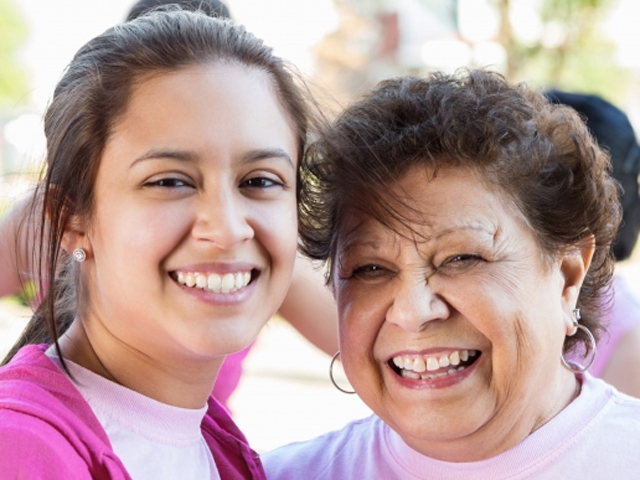Ageing Well Through the Menopause

Whether you're dreading 'The Change' or looking forward to the freedom it can bring, for most women in their midlife years, menopause is on the menu.
And while this life stage may bring changes and challenges, there are positive steps that women can take to improve their health and wellbeing during this time.
When does the menopause occur? Defined as the final menstrual period, the menopause typically occurs for women in Australia at around 51-52 years of age. However, reaching it any time from 45-55 years is considered normal.
For some women, the menopause can occur earlier as a result of cancer treatment, surgery or other unknown causes.
The journey that varies There is no one way to go through the menopause. Each woman's experience is unique.
There is a range of physical, mental and emotional symptoms that are commonly associated with the menopause, but which can vary greatly in terms of how mild or severe they are.
In fact, while 20% of women will have no menopausal symptoms, 60% will experience mild to moderate symptoms and the remaining 20% will have symptoms so severe that they significantly interfere with their daily life.
Some of the common symptoms of the menopause are hot flushes, vaginal changes and mood swings.
Symptoms typically occur because of changes in hormone levels; in particular, the dramatic drop in the female hormone called oestrogen.
Hormones, hormones, hormones One way to relieve to relieve the troublesome symptoms of the menopause is by using menopausal hormone therapy (MHT, formerly known as hormone replacement therapy or HRT).
In the recent episode called 'Ageing Well' on ABC TV's Ask the Doctor program, Jean Hailes Medical Director and gynaecologist Dr Elizabeth Farrell was asked how effective MHT is at treating troublesome symptoms of the menopause.
"[MHT is] very effective in women who have moderate to severe symptoms," explains Dr Farrell. "Really, for the women who suffer from menopausal symptoms that impact on their quality of life, menopausal hormone therapy is a godsend."
Dr Farrell says that MHT often gives women back a sense of control in what can be a challenging time.
"The number of women who come in, once they've gone on it [MHT], and say 'I've got my body back, I've got my brain back, I've got me back'. Their quality of life has improved greatly," she says.
MHT explained MHT works as a medical replacement of the hormone oestrogen, often combined with progesterone, and sometimes also testosterone.
Because many symptoms of the menopause are related to low or fluctuating oestrogen, taking a medicine of this hormone (for a period of time) can help to control these symptoms.
Research has shown MHT can provide relief for menopausal hot flushes, sweats, mood swings, irritability, insomnia, joint aches and vaginal dryness.
But as mentioned in Ask the Doctor, MHT has a controversial past.
In 2002, researchers from a large American study (the Women's Health Initiative trial, or WHI) reported that the risks of MHT outweighed the benefits of taking it.
This caused an 80% drop in the use of MHT in the United States, and 50% of women in Australia stopped using their MHT.
However, Dr Farrell clarifies the situation, explaining that the research was flawed and many women stopped their medications unnecessarily.
"We know now there were so many issues in the publication of that data; that it was wrong in the way in which they published the data," says Dr Farrell in Ask the Doctor.
What we now know A recent comprehensive review of the evidence on MHT has found it to be safe and effective for the relief of menopausal symptoms in healthy women.
The data from this study has shown that in women between 50 and 60 years (the typical age range prescribed MHT), the risks are low.
There are several health conditions or situations where MHT is not recommended for women – for example, women with current, past or suspected breast or uterine cancers, undiagnosed vaginal bleeding or coronary heart disease – so it is very important to seek advice from a trusted GP and discuss your individual needs and health history.
More ways to age well through the menopause The menopause, for many women, can be a time when they press pause on always meeting the needs of others, and start to put their own lives and their health first. Here are some research-based tips to help you age well and stay in good health:
Prevent brain-age with mind-boosting foods. Backed up by solid evidence, this way of eating can help support your memory and mind as well as reduce the risk of dementia and Alzheimer's disease. Read about the MIND diet.
Move more. Studies show that regular exercise can help women going through the menopause by improving quality of life and increasing emotional wellbeing.
Limit the vices. The National Health and Medical Research Council recommend limiting alcohol intake to no more than two standard drinks on any day, as well as having at least two alcohol-free days every week, to reduce the risk of long-term harm.
Stay social. The menopause and ageing can have significant effects on mental and emotional health, so it's particularly important – and beneficial – to have strong social connections during this life stage.
Watch the whole episode ABC TV's Ask the Doctor episode 'Ageing Well', or read more about managing the menopause on the Jean Hailes website.
Published with the permission of Jean Hailes for Women's Health
jeanhailes.org.au
1 800 JEAN HAILES (532 642)
And while this life stage may bring changes and challenges, there are positive steps that women can take to improve their health and wellbeing during this time.
When does the menopause occur? Defined as the final menstrual period, the menopause typically occurs for women in Australia at around 51-52 years of age. However, reaching it any time from 45-55 years is considered normal.
For some women, the menopause can occur earlier as a result of cancer treatment, surgery or other unknown causes.
The journey that varies There is no one way to go through the menopause. Each woman's experience is unique.
There is a range of physical, mental and emotional symptoms that are commonly associated with the menopause, but which can vary greatly in terms of how mild or severe they are.
In fact, while 20% of women will have no menopausal symptoms, 60% will experience mild to moderate symptoms and the remaining 20% will have symptoms so severe that they significantly interfere with their daily life.
Some of the common symptoms of the menopause are hot flushes, vaginal changes and mood swings.
Symptoms typically occur because of changes in hormone levels; in particular, the dramatic drop in the female hormone called oestrogen.
Hormones, hormones, hormones One way to relieve to relieve the troublesome symptoms of the menopause is by using menopausal hormone therapy (MHT, formerly known as hormone replacement therapy or HRT).
In the recent episode called 'Ageing Well' on ABC TV's Ask the Doctor program, Jean Hailes Medical Director and gynaecologist Dr Elizabeth Farrell was asked how effective MHT is at treating troublesome symptoms of the menopause.
"[MHT is] very effective in women who have moderate to severe symptoms," explains Dr Farrell. "Really, for the women who suffer from menopausal symptoms that impact on their quality of life, menopausal hormone therapy is a godsend."
Dr Farrell says that MHT often gives women back a sense of control in what can be a challenging time.
"The number of women who come in, once they've gone on it [MHT], and say 'I've got my body back, I've got my brain back, I've got me back'. Their quality of life has improved greatly," she says.
MHT explained MHT works as a medical replacement of the hormone oestrogen, often combined with progesterone, and sometimes also testosterone.
Because many symptoms of the menopause are related to low or fluctuating oestrogen, taking a medicine of this hormone (for a period of time) can help to control these symptoms.
Research has shown MHT can provide relief for menopausal hot flushes, sweats, mood swings, irritability, insomnia, joint aches and vaginal dryness.
But as mentioned in Ask the Doctor, MHT has a controversial past.
In 2002, researchers from a large American study (the Women's Health Initiative trial, or WHI) reported that the risks of MHT outweighed the benefits of taking it.
This caused an 80% drop in the use of MHT in the United States, and 50% of women in Australia stopped using their MHT.
However, Dr Farrell clarifies the situation, explaining that the research was flawed and many women stopped their medications unnecessarily.
"We know now there were so many issues in the publication of that data; that it was wrong in the way in which they published the data," says Dr Farrell in Ask the Doctor.
What we now know A recent comprehensive review of the evidence on MHT has found it to be safe and effective for the relief of menopausal symptoms in healthy women.
The data from this study has shown that in women between 50 and 60 years (the typical age range prescribed MHT), the risks are low.
There are several health conditions or situations where MHT is not recommended for women – for example, women with current, past or suspected breast or uterine cancers, undiagnosed vaginal bleeding or coronary heart disease – so it is very important to seek advice from a trusted GP and discuss your individual needs and health history.
More ways to age well through the menopause The menopause, for many women, can be a time when they press pause on always meeting the needs of others, and start to put their own lives and their health first. Here are some research-based tips to help you age well and stay in good health:
Prevent brain-age with mind-boosting foods. Backed up by solid evidence, this way of eating can help support your memory and mind as well as reduce the risk of dementia and Alzheimer's disease. Read about the MIND diet.
Move more. Studies show that regular exercise can help women going through the menopause by improving quality of life and increasing emotional wellbeing.
Limit the vices. The National Health and Medical Research Council recommend limiting alcohol intake to no more than two standard drinks on any day, as well as having at least two alcohol-free days every week, to reduce the risk of long-term harm.
Stay social. The menopause and ageing can have significant effects on mental and emotional health, so it's particularly important – and beneficial – to have strong social connections during this life stage.
Watch the whole episode ABC TV's Ask the Doctor episode 'Ageing Well', or read more about managing the menopause on the Jean Hailes website.
Published with the permission of Jean Hailes for Women's Health
jeanhailes.org.au
1 800 JEAN HAILES (532 642)
MORE



